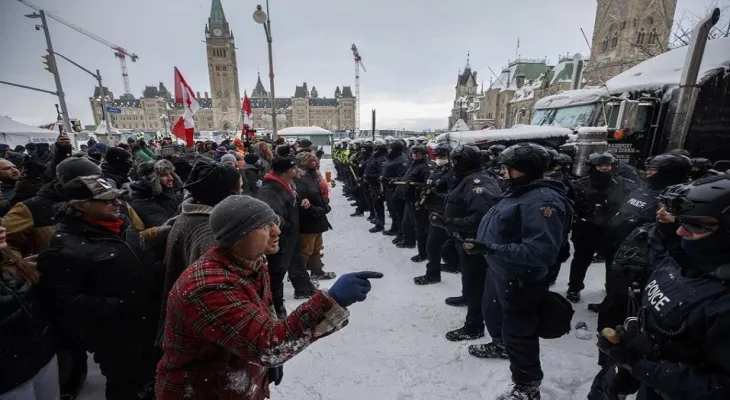Search here
Newspaper
Search here

Arab Canada News
News

Published: October 10, 2022
The liberal government invoked the Emergencies Act on February 14, granting the police extraordinary temporary powers to remove people from downtown Ottawa and allowing banks to freeze the accounts of some involved individuals.
The decision came after nearly three weeks of protesters who had their trucks blocking the streets of downtown Ottawa and also placed a blockade on several border crossings.
The protesters, who raised millions of dollars through online crowdfunding sites, called for an end to the federal government's COVID-19 vaccine mandates, and in some cases, the end of the Trudeau government.
By mid-February, the protesters had set up a bouncy castle, a hot tub, and dozens of buildings in the streets surrounding Parliament Hill, while people on large platforms kept their trucks running and honked their horns day and night until a court order was issued to reduce the noise. The protesters vowed to stay.
The noise and disruption led to increasing frustration from people living nearby, with Ottawa police officials and city officials describing the situation as "chaos" as they struggled to maintain order. Trudeau pointed to "serious challenges for law enforcement’s ability to effectively enforce the law" when he announced plans to invoke the Act for the first time since its introduction in 1988.
At the time he said, "This is about keeping Canadians safe and protecting people’s jobs and restoring confidence in our institutions." The Emergencies Act requires a public inquiry to examine the government decision-making process whenever it is invoked. A Public Order Emergency Commission and an Ontario Court of Appeal judge, Paul Rouleau, the commissioner, will assess the basis of the government decision and the appropriateness and effectiveness of the measures taken to deal with the blockades.
They will also review whether any changes should be made to the Emergencies Act itself. Since its establishment on April 25, the commission has been gathering documents and conducting interviews with dozens of people,
including central figures in the "Freedom Convoy" such as Tamara Lich, Chris Barber, Pat King, James Bauder – all facing criminal charges due to their roles. The draft list of potential witnesses for the hearings includes outgoing Ottawa Mayor Jim Watson, senior city officials, members of the Ottawa Police Services Board, and David Vigneault, Director of the Canadian Security Intelligence Service. Peter Sloly, who resigned as Ottawa police chief during the convoy, and his successor, interim police chief Steve Bell, are also expected to testify. Also, Finance Minister Chrystia Freeland and Public Safety Minister Marco Mendicino. Mendicino told journalists last week that the Emergencies Act was necessary to restore order nationwide, including Wellington Street "where the situation for three weeks was untenable."
The temporary measures under the Act gave the police greater leeway to make arrests, impose fines, tow vehicles, and freeze assets. Mendicino said, "We will fully cooperate with Judge Rouleau and his review and his committee, and look forward to any lessons learned or recommendations that emerge."
Keith Wilson, a lawyer at the Justice Centre for Constitutional Freedoms representing several key convoy organizers, said his clients are eager to talk about what was happening and why they were in Ottawa. He said, "They hope it will become clear, which many already know, that there was no need to invoke the Emergencies Act." Several community groups representing residents of downtown Ottawa and surrounding areas are also participating.
Louise Lapointe, who leads the Sandy Hill Action organization, said, "I hope they delve a bit deeper into the actual impact on businesses and residents and not just the occupation." The government said it would provide sensitive ministerial documents to the commission but there were concerns about whether those and other important information would be disclosed.
Rouleau did not say whether he would release information protected by cabinet confidence. Ryan Alford, a professor at Lakehead University representing the Canadian Constitution Foundation in the inquiry, expressed concern that government and police agencies would try to keep evidence from the public, citing national security concerns.
He said, "That would be a nightmare." The commission's lawyers will cross-examine witnesses as in regular court hearings, but unlike the court, the inquiry is tasked with fact-finding and making recommendations rather than assigning blame.
Kara Zwibel, a lawyer at the Canadian Civil Liberties Association, says the process will hold the government accountable and help get the complete story about why cabinet enacted the Emergencies Act.
Edited by: Yusra Bamtarf
Comments